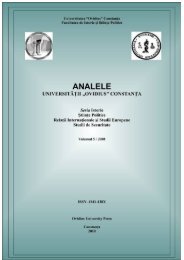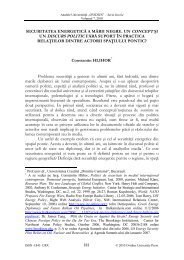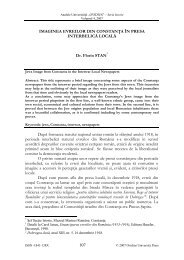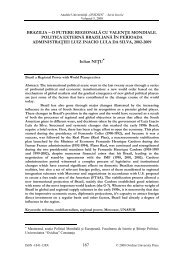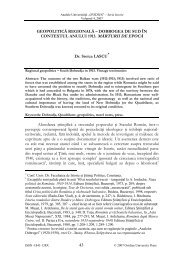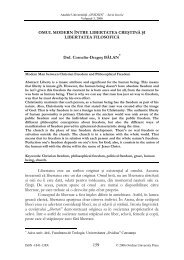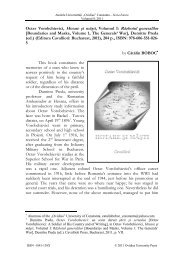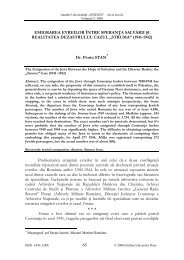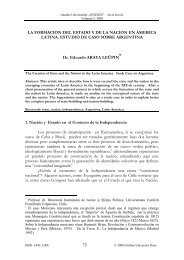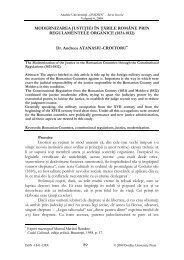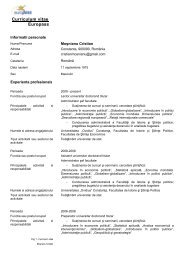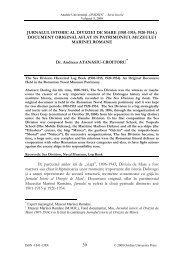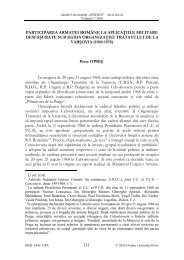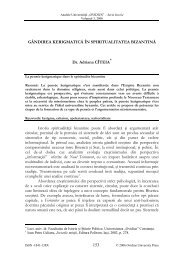analele universitÄÅ£ii âovidiusâ constanÅ£a - AUOCSI
analele universitÄÅ£ii âovidiusâ constanÅ£a - AUOCSI
analele universitÄÅ£ii âovidiusâ constanÅ£a - AUOCSI
You also want an ePaper? Increase the reach of your titles
YUMPU automatically turns print PDFs into web optimized ePapers that Google loves.
Analele Universităţii „OVIDIUS” – Seria Istorie<br />
Volumul 6, 2009<br />
NICOLAE IORGA’S OPINION ON EARLY MODERN SCOTLAND<br />
Costel COROBAN <br />
Abstract: This short study aims to shed some light on Nicolae Iorga’s opinions on early<br />
modern Scotland expressed in two of his works: Evoluţia ideii de libertate [The<br />
Evolution of the Idea of Freedom] and Oliver Cromwell. Conferinţă ţinută la Societatea<br />
Anglo-Română [Oliver Cromwell. Conference held at the Anglo-Romanian Society].<br />
While he refers to Scotland in many of his universal history works (as expected, many<br />
times in A History of Anglo-Romanian Relations), in these two works he actually makes<br />
judgements on the importance of Scotland to modern Europe. After making a summary<br />
of these judgements I go on to detailing important facts about early modern Scotland,<br />
especially emphasizing it’s role in the 17 th century Revolutionary events in Britain, while<br />
taking in consideration the approaches exposed in recent scholarly articles on the issue.<br />
Keywords: Nicolae Iorga, Scotland, Presbyterianism, John Knox, James I<br />
Introduction<br />
“And this Scotland lived, after the<br />
demise of Mary Stuart, especially in<br />
the northern clans, which were<br />
decisive for a time, a biblical life.”<br />
Nicolae Iorga <br />
Although “The sheer weight of Iorga’s writings […] probably<br />
discouraged any Westerner from plowing through this incredible mass to secure<br />
an insight into this Romanian historian’s contributions,” 1 his works were<br />
appreciated by Western scholars of his times and not only, 2 and furthermore had<br />
created the image that “Roumanian writers have facile pens.” 3<br />
Postgraduate student in International Relations, Faculty of History and Political Sciences,<br />
“Ovidius” University of Constanta.<br />
Nicolae Iorga, Evoluţia ideii de libertate [The Evolution of the Idea of Freedom], Editura<br />
Meridiane, Bucureşti, 1987, p. 241.<br />
1 Sherman D. Spector, “Review of The Historical and National Thought of Nicolae Iorga by<br />
William O. Oldson, Columbia University Press, New York, 1973, pp. 135,” in The American<br />
Historical Review, vol. 80, no. 3, June 1975, p. 688.<br />
2 See G. R. C., “Review of A History of Roumania: Land, People, Civilisation. – N. Iorga,<br />
London: T. Fisher Unwin, Ltd. 1925. pp. xii + 284,” in The Geogrpahical Journal, vol. 68,<br />
no. 1, July 1926, pp. 81-82; Halil Inalcik, “Review of Nicolae Iorga: A Romanian Historian<br />
of the Ottoman Empire by Maria Matilda Alexandrescu-Dersca Bulgaru. Bibliotheca<br />
Historica Romaniae Studies, no. 40, 1972, pp. 190,” in The Journal of Modern History, vol.<br />
46, no. 1, March 1974, pp. 110-112; Sherman D. Spector, “Review of The Historical and<br />
ISSN -1841-138X 207 © 2009 Ovidius University Press



